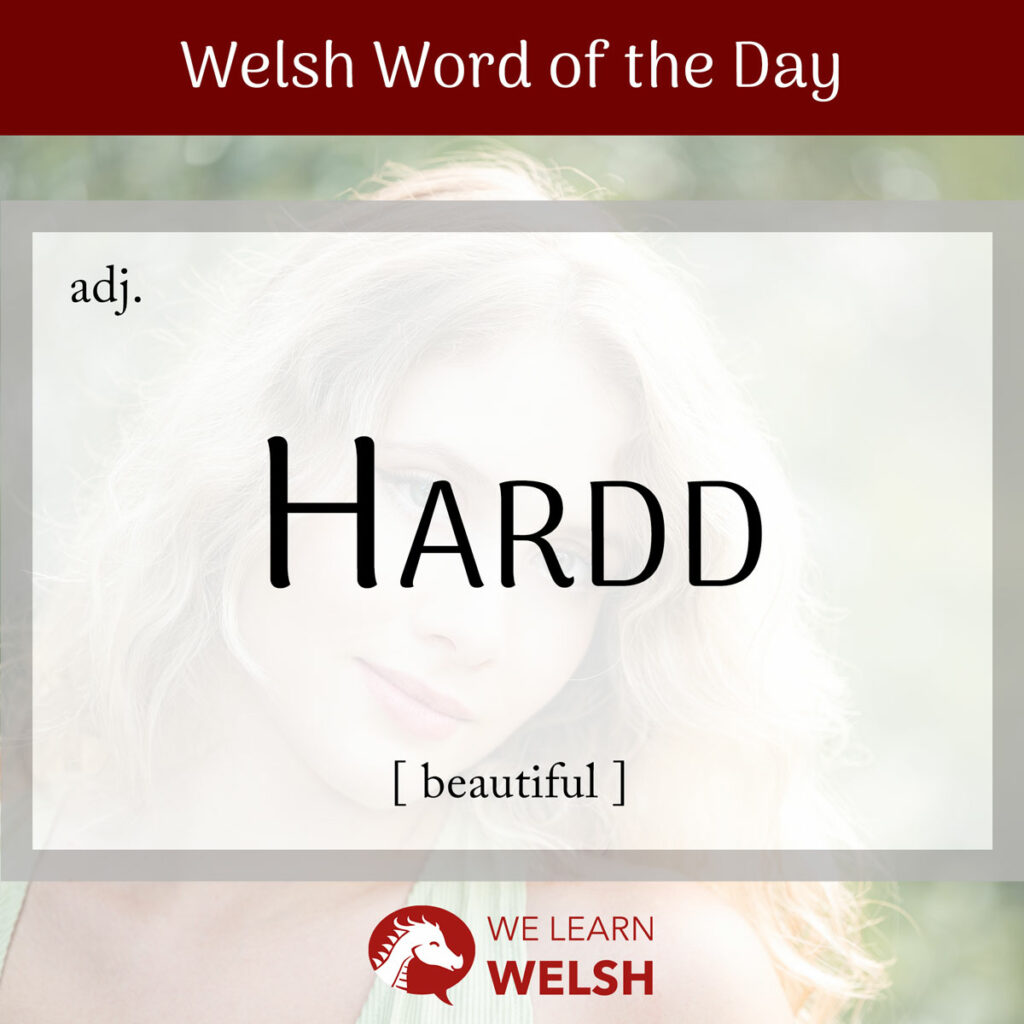Hardd is a common Welsh word meaning beautiful. It can be used to describe all kinds of people and things, and it shows up often in barddoniaeth (poetry), cerddoriaeth (music), and llên grefyddol (religious writings).
hardd
beautiful
This word likely comes from the word ardd meaning a high place, which is ultimately derived from the Latin arduus, lofty or high. This etymology creates a sense of nobility and elevation around the word which takes its meaning beyond simple physical beauty. In fact, although beautiful is for all intents and purposes a good translation of this word, I never feel it fully captures it.
There are plenty of words in Welsh that are derived from hardd. The most useful is probably harddwch (beauty), as harddu (to beautify) doesn’t come up that often, and anhardd (unbeautiful) is usually discarded in favour of hyll (ugly).
The word harddwych, a portmanteau of hardd and gwych (great), is not used much these days, but it means splendid or gorgeous.
Since hardd begins with the non-mutating letter h, it never undergoes any mutation in Welsh. Don’t be thinking you’ve escaped from alternative forms of the word though – it is useful to learn the comparative forms. Luckily, they follow the usual pattern for comparative words in Welsh, being hardded (equally beautiful), harddach (more beautiful), and harddaf (most beautiful).
Hardd remains the same whether it’s describing a masculine or feminine subject. You can, and technically should, use heirdd if you are describing multiple beautiful things, but it’s quite usual to just leave it as hardd in colloquial speech.
There are an absolute myriad of synonyms for this word though! Check out some of these:
- prydferth = beautiful
- pert / del = pretty / cute
- twt = cute / dainty
- hyfryd = lovely
- teg = fair
- tlws / tlos = pretty
- golygus = good-looking
- cain = fine / beautiful
Other than hyll, the most common antonym is probably the Southern salw, which is also best translated as ugly. You might also come across the euphemistic diolwg (not good-looking).
Mae Georgia yn hardd iawn wir.
Georgia really is very beautiful.
Welsh beauty standards have historically not differed much from the rest of Britain or indeed Europe. Medieval women prized croen golau (pale skin), as it showed that the bearer had the luxury of not having to perform manual labour. For example, the beautiful and intelligent Rhiannon in the stories of the Mabinogion is praised for her skin’s being whiter than brigwyn (seafoam).
Long hair, worn in plethau (plaits), was seen as a sign of benyweiddiwch (femininity). Particularly prized was blonde hair, and princesses and heroines in folklore with this trait, rare in the indigenous Welsh population, were often described with the epithet ben aur (golden-head).
Descriptions of beauty in Welsh poetry and literature are elegant and elaborate, like the below example, taken from an old folk song:
Mil harddach wyt na’r rhosyn gwyn.
You are a thousand times more beautiful than the white rose.
Like the English beautiful, hardd can be used to describe people no matter their gender, but is more often used for women and girls. Especially in modern Wales, you are likely to use the term menyw hardd (beautiful woman) or merch hardd (beautiful girl) much more frequently than dyn hardd (a beautiful man) or bachgen hardd (a beautiful boy). In the latter two cases, golygus is another option.
But hardd is not just for people. Some other things you might want to dsescribe in this way include:
- golwg hardd = a beautiful view
- ffrog hardd = a beautiful dress
- paentiad hardd = a beautiful painting
- gwên hardd= a beautiful smile
- tŷ hardd= a beautiful house
- mwclis hardd = a beautiful necklace
- dawns hardd = a beautiful dance
- blodyn hardd = a beautiful flower
And it doesn’t just have to be used for things that look beautiful. For example, you could talk about a cân hardd (beautiful song). If you’re speaking more abstractly, such as about a beautiful feeling, hyfryd would be more appropriate.
Harddwch (beauty) may not be everything, but hardd is still a lovely canmoliaeth (compliment) to give to someone you love or admire. Why not try it in Welsh today?


